
Publications
From climate change to online disinformation, our publications provide evidence-based, nonpartisan insight from top scholars and practitioners into complex global challenges. IGP publications draw on the latest research from Columbia University and beyond to bring together diverse perspectives and provide practical recommendations to guide policy action around the world.
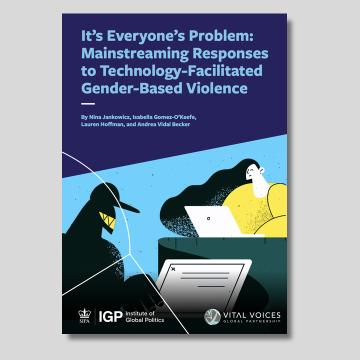
It’s Everyone’s Problem: Mainstreaming Responses to Technology-Facilitated Gender-Based Violence
Authors: Nina Jankowicz, Isabella Gomez-O’Keefe, Lauren Hoffman, and Andrea Vidal Becker
Technology facilitated gender-based violence (TFGBV) is not an intractable problem. But it must no longer be the responsibility solely of women’s advocacy groups. Others – technology companies, governments, civil society organizations, law enforcement, businesses, schools – must step up and work in unison to combat TFGBV in order to to reflect its mainstreamed effects on society. This new IGP report, drawing on a case study around the online harassment of Australian eSafety Commissioner Julie Inman Grant, assesses the state of research on TFGBV as well as recent global policy progress made on this issue, and offers a number of practical solutions to make women and girls safer online.
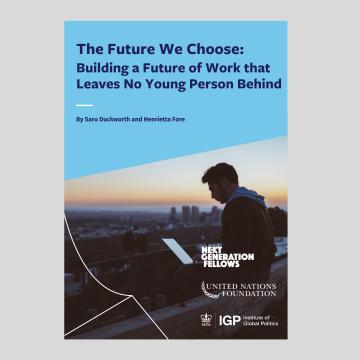
The Future We Choose: Building a Future of Work that Leaves No Young Person Behind
Authors: Saru Duckworth and Henrietta Fore
Slow progress on education and poverty reduction is costing young people their futures. Authors Saru Duckworth, an IGP Student Scholar, and Henrietta Fore, an inaugural IGP Carnegie Distinguished Fellow, worked together as the lead authors of the report published by the Next Generation Fellows and United Nations Foundation in partnership with IGP. The report marks one of the most significant collaborations to date between one of IGP’s Carnegie Distinguished Fellows and an IGP Student Scholar.
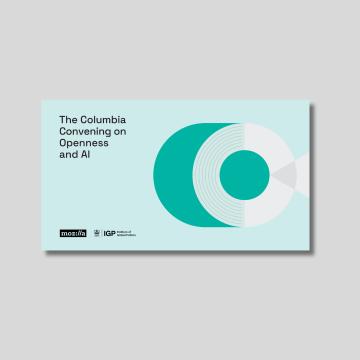
Towards a Framework for Openness in Foundation Models: Proceedings from the Columbia Convening on Openness in Artificial Intelligence
Authors: Adrien Basdevant, Camille François, Victor Storchan, Kevin Bankston, Ayah Bdeir, Brian Behlendorf, Merouane Debbah, Sayash Kapoor, Yann LeCun, Mark Surman, Helen King-Turvey, Nathan Lambert, Stefano Maffulli, Nik Marda, Govind Shivkumar, Justine Tunney
The Institute of Global Politics (IGP) and Mozilla worked with leading artificial intelligence scholars and practitioners to create a framework on openness and AI. The May 2024 paper surveys existing approaches to defining openness within AI models and systems, and then proposes a descriptive framework to understand how each component of the foundation model stack contributes to openness.
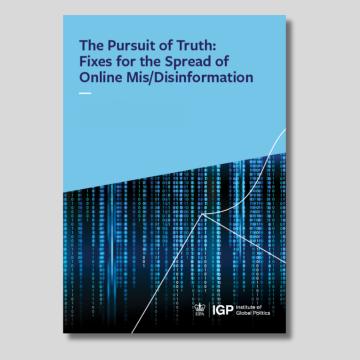
The Pursuit of Truth: Fixes for the Spread of Online Mis/Disinformation
Author: Anya Schiffrin
The European Union has politically agreed on the world’s most far-reaching attempt to rein in the powers of Artificial Intelligence. At the heart of the matter is the dangers posed by generative AI systems like ChatGPT to produce text, spread dis/misinformation and fake news virally, and create illegal content. The global information ecosystem, in short, is at a crossroads. In this new study, Anya Schiffrin, director of the Technology, Media, and Communications at Columbia SIPA, examines the promise and pitfalls of demand-side (awareness raising, fact-checking) versus supply-side (government regulation, content moderation) solutions to ensure a healthy ecosystem of information while also maintaining freedom of expression.
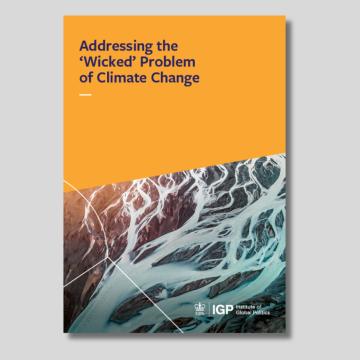
Addressing the 'Wicked' Problem of Climate Change
Authors: Joseph Stiglitz, Scott Barrett, and Noah Kaufman
The COP28 summit in Dubai revealed the difficulties of finding global consensus around climate change, a “wicked problem” that defies easy solutions. Early prescriptions for climate solutions focused on idealistic "optimal" policies and all-encompassing global treaties. With global emissions still climbing, more radical reductions are needed sooner and new approaches to promote global collective action. In this IGP report, three Columbia economists — Joseph Stiglitz, a Nobel Laureate in economics, Scott Barrett, a leading climate economist, and Noah Kaufman, a former White House senior advisor on climate economics — describe a more nuanced, realistic, and strategic vision for climate progress.